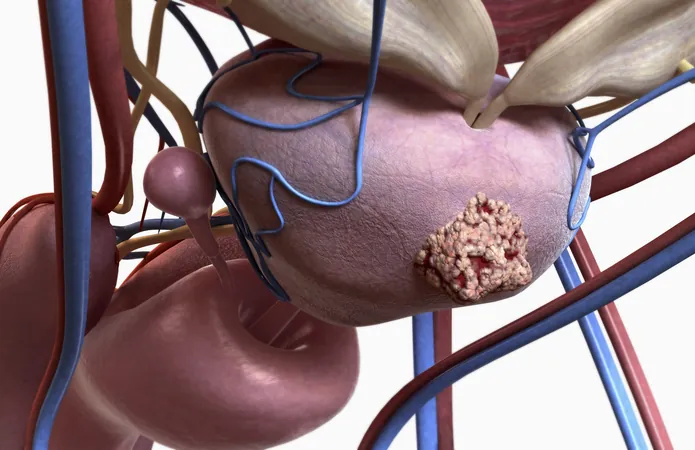
Unlocking the Mystery: EZH2 Enzyme May Be Key to Overcoming Prostate Cancer Drug Resistance!
2024-11-20
Author: Siti
Introduction
In a groundbreaking discovery, researchers at Weill Cornell Medicine have unveiled a shocking role for the enzyme EZH2—an enzyme that could be the linchpin in the fight against aggressive prostate cancer, especially in cases resistant to current treatments. Their findings, published in *Nature Communications*, illuminate the critical ways that EZH2, under the control of the protein kinase PKCλ/ι, facilitates tumor progression by evading destruction within the cellular waste management system known as proteasomes.
Research Impact
This study, led by renowned oncologists Maria Diaz-Meco, PhD, and Jorge Moscat, PhD, sees its revelations heralding hope to patients battling advanced castration-resistant prostate cancer (CRPC)—a disease notorious for its evasiveness to therapies. “Overcoming therapeutic resistance is a formidable challenge in CRPC,” the researchers assert. “Cancer cells can adapt through lineage plasticity, transitioning to a neuroendocrine phenotype that allows them to withstand even targeted interventions.
Key Findings
The research highlights an unsettling discovery: in the absence of PKCλ/ι, EZH2 morphs into a more aggressive form that not only survives but thrives against androgen receptor inhibitors, drugs designed to slow or halt cancer growth. While PKCλ/ι generally keeps EZH2 in check, its deficiency opens the door for this transformed EZH2 to bypass tumor-suppressing genes, ramping up protein production that actively nurtures the tumor environment, even when traditional therapies are applied.
Potential Treatment Strategies
“This pivotal study offers insight into the mechanisms driving treatment resistance in prostate cancers,” explained Diaz-Meco. “If we decode how EZH2 operates in this setting, we could potentially re-sensitize tumors to existing drugs or expose them to new targeted therapies, like immunotherapies.”
In preclinical trials, the investigators targeted the untamable activities of EZH2 to explore innovative treatment avenues. They found that inhibiting either protein synthesis or the TGF-β signaling pathway could effectively counteract resistance in cancer cells lacking PKCλ/ι. Furthermore, halting EZH2’s rogue activities restored sensitivity to androgen receptor therapies, such as enzalutamide. Since TGF-β is known to restrict immune responses within tumors, blocking this pathway could potentially bolster the effectiveness of immunotherapy—an area with previously disappointing results in prostate cancer treatment.
Conclusion and Future Directions
This landmark study emphasizes the unique vulnerabilities inherent in prostate cancer cells missing PKCλ/ι, pointing toward the promising strategy of combining EZH2 inhibitors with therapies targeting the androgen receptor. Nonetheless, caution is advised; inhibiting EZH2 in cancers high in PKCλ/ι may counteract desired therapeutic effects, leading to the necessity for tailored treatment strategies for such patients. The complexity surrounding the EZH2 pathway highlights the importance of diligently balancing treatment approaches to sustain their benefits.
As this research opens new doors, it presents a bright future for clinical trials that will merge androgen receptor inhibitors with EZH2 or TGF-β blockers, particularly for those grappling with therapy-resistant prostate cancer. What does this mean for the battle against cancer? Only time will tell, but the prognosis looks increasingly promising!


 Brasil (PT)
Brasil (PT)
 Canada (EN)
Canada (EN)
 Chile (ES)
Chile (ES)
 España (ES)
España (ES)
 France (FR)
France (FR)
 Hong Kong (EN)
Hong Kong (EN)
 Italia (IT)
Italia (IT)
 日本 (JA)
日本 (JA)
 Magyarország (HU)
Magyarország (HU)
 Norge (NO)
Norge (NO)
 Polska (PL)
Polska (PL)
 Schweiz (DE)
Schweiz (DE)
 Singapore (EN)
Singapore (EN)
 Sverige (SV)
Sverige (SV)
 Suomi (FI)
Suomi (FI)
 Türkiye (TR)
Türkiye (TR)